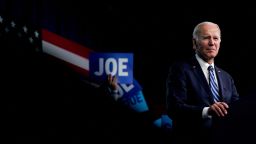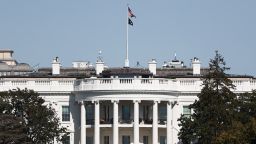Editor’s Note: David Axelrod, a CNN senior political commentator and host of “The Axe Files,” was a senior adviser to former President Barack Obama and chief strategist for the 2008 and 2012 Obama presidential campaigns. The opinions expressed in this commentary are his own. View more opinion on CNN.
President Joe Biden was the toast of Ireland last week, as he was treated to a hero’s welcome in a pageant-laden return to his ancestral home.
Meanwhile, back in the USA, Biden is saddled with job approval ratings in the low 40s, a traditional warning sign for any incumbent on the cusp of launching a campaign for reelection. Even more concerning for the president are his ratings among the crucial independent voting block, which sit in the mid-20s to mid-30s, depending on the poll.
Biden, who is expected to formalize his plans next week, has a significant body of achievements on which to run. But continued concerns about the economy and his age and capacities – he would be a record-breaking 82 at the time of his second inauguration – have bogged him down.
Even among Democrats, Biden’s polling is ambiguous. Around 8 in 10 approve of the job the president is doing, but less than half say they want him to run again – and just 44% say they believe he’s the party’s strongest candidate. (These numbers have actually improved in recent weeks.)
Yet as he returned from the Emerald Isle, Biden was the all-but-certain nominee of his party. No serious primary challenger has emerged, though two candidates have: Robert F. Kennedy Jr., heir to a hallowed name he has sullied with misinformed and irresponsible jeremiads about the dangers of vaccines; and Marianne Williamson, the author, spiritual teacher and progressive activist who ran and lost decisively in 2020. Neither is likely to mount a competitive challenge. And barring unforeseen circumstances — a presidential stumble or illness; a self-funding billionaire’s yearning to run — no such challenge seems forthcoming.
So is the absence of a real primary challenge simply the luck of the Irish?
Mostly, no.
First, there are enormous advantages to incumbency that discourage challenges. Presidents have national political and fundraising networks, and the awesome power, platform and trappings of the office. They also have control of their party apparatus.
Serious challenges to even embattled presidents are rare. Pat Buchanan’s right-wing populist challenge to President George H.W. Bush in 1992 failed (though it did damage Bush’s chances for reelection). And Sen. Ted Kennedy of Massachusetts, the most recent candidate to launch a serious challenge, actually threatened the reelection campaign of incumbent President Jimmy Carter in 1980 but ultimately fell short.
Perhaps with that primary battle in mind, Biden has worked assiduously to court the progressive wing of the party, from which such Democratic primary challenges generally arise. His signature domestic achievement, the Inflation Reduction Act, included a number of significant and longstanding progressive goals: an historic package to combat climate change; a long-sought measure that empowers Medicare to use its huge market leverage to negotiate with pharmaceutical companies for lower prescription drug prices; a cap on insulin costs for seniors at $35; and several steps to strengthen and expand the Affordable Care Act.
Biden also signed a massive infrastructure bill favored by organized labor; the first significant bipartisan gun safety law in decades; and the Respect for Marriage Act, enshrining protections for same-sex and interracial marriage in federal law.
And Biden has benefited from Republicans digging in their heels on issues such as abortion rights and guns, which has helped to rally the Democratic base.
Second, structurally, the president has altered the playing field in a way that should make it harder for a challenger to elbow in. Biden’s supporters on the Democratic National Committee (DNC) followed his recommendations and set up a firewall by voting to change the calendar of early 2024 primary contests to favor states in which he would be expected to win handily.
Gone completely from the official calendar are the Iowa caucuses, the traditional campaign kickoff event but one that treated Biden rudely with a fourth-place finish in 2020. Instead, the calendar will begin in South Carolina, a Biden stronghold where Black and moderate White voters revived his flagging candidacy and launched him toward the presidency.
New Hampshire, where Biden finished a dismal fifth in 2020, is scheduled to go second, but it will be joined by Nevada, a state where Biden can expect better treatment. Under the DNC plan, Michigan and Georgia, two other Biden-friendly states, will then follow. Not all of these changes are set in stone, however, as New Hampshire, long home to the first-in-the-nation primary (as distinct from the caucuses held in Iowa) is threatening to move its 2024 date forward, in defiance of the DNC, to keep its time-honored status. Republicans in Georgia could block the move to an earlier state primary date.
Finally, there is former President Donald Trump, whose candidacy is a boost to Biden among Democrats.
Get Our Free Weekly Newsletter
- Sign up for CNN Opinion’s newsletter
- Join us on Twitter and Facebook
Despite his mounting legal woes, Trump, buoyed by his implacable base, remains a frontrunner to be his party’s nominee in 2024. While many Democrats see the disgraced and indicted former president as eminently beatable, they have been down this road before. The specter of Trump, just one step away from a return to the presidency, is both horrifying and unifying.
Biden’s supporters have argued that, given the stakes, the party can ill-afford a fractious primary or newbie nominee. So, despite the concerns about Biden’s durability and still-lingering disquiet among some progressives, the Democratic tribe will likely rally behind its aged but tested chief as their best bet to stop Trump again.
Having endured doubts about his age and stamina four years ago, when he set out on his successful bid to oust Trump from the White House, Biden enters a new campaign relying on the wisdom of another famous Irish-American politician he’s fond of quoting.
“Don’t compare me to the Almighty,” said the late Boston Mayor Kevin White. “Compare me to the alternative.”






